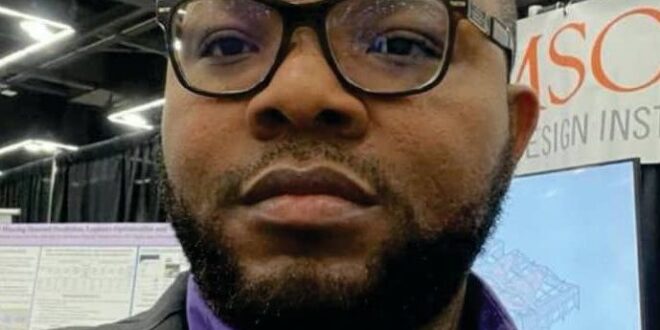By Amraheobu Ile
Ijeoma Williams Muzan is a Nigerian and a Ph.D. candidate in Environmental Engineering and Earth Sciences at Clemson University, specializing in the life cycle and techno-economic assessments of renewable energy systems.
He holds a master’s degree in renewable energy technologies. He has a strong background in project management, research design, technical communication, and data analysis, with experience of publishing research and presenting at conferences, also possesses industrial experience in product development and construction project management.
He has received awards for academic achievements from the government of Rivers State, Nigeria and the World Bank African Centre of Excellence (ACE). He is also a recipient of the 2021 CEO award in Ogba/Egbema/Ndoni Local Government Area from IPEEMA.Ijeoma Williams Muzan’s Life Cycle Assessment (LCA) and Techno-Economic Assessment (TEA) backgrounds have influenced his research in environmental engineering.
He conducts a comprehensive LCA of the environmental impacts of mass timber building construction, light-duty vehicles, and renewable energy systems. Muzan’s expertise in TEA also helps evaluate the economic viability of sustainable technologies, providing insights into the cost-effectiveness and feasibility of renewable energy projects. He has applied his project management and technical skills to projects like industrial robot implementation, coordinating research and design teams, and developing chemical formulas for personal care products for Patcares Global Services in Nigeria.Ijeoma Williams Muzan, a member of the Association of Energy Engineers (AEE) and the Institute of Electrical and Electronics Engineers (IEEE), has gained valuable networking opportunities, access to the latest research, and collaboration opportunities, thus enhancing his career in environmental engineering.
He is an author and have publisher of several reputable academic journals. His latest publication in the Energies MDPI Journal, Techno-economic assessment of the viability of commercial solar PV system in Port Harcourt, Rivers State, Nigeria, helps to reduce the dependence of commercial centers on diesel generators for their electricity generation. This research can aid in the reduction of environmental impact from these diesel generators and help Nigeria achieve its net zero carbon targets in the recently passed 2021 Climate Change Act, which seeks to achieve low greenhouse gas emissions and green and sustainable growth by providing the framework to set a target to reach net zero between 2050 and 2070.
The study also highlights the economic benefits of implementing solar PV systems over diesel generators, potentially saving businesses in Nigeria significant costs in the long run. By showcasing the feasibility and advantages of solar energy, this research could pave the way for the widespread adoption of renewable energy solutions in commercial settings across Nigeria.The summary of the journal article is stated below: The introduction provides an overview of the study’s focus on analyzing the feasibility and benefits of replacing diesel generators with solar PV systems in commercial settings, specifically supermarkets in Port Harcourt, Nigeria. It evaluates the economic viability, energy efficiency, and environmental impact of utilizing solar PV systems as an alternative energy source. Key economic indicators such as net present value, levelized cost of electricity, payback period, and internal rate of return are used to assess the financial feasibility of implementing solar PV systems.
The introduction also highlights the potential for cost savings, reduced carbon emissions, and additional income generation through selling excess energy back to the grid.
The materials and methods involved in the study included conducting an energy audit at the supermarkets to determine daily electrical load demand, designing a solar PV system to meet the load demand, and assessing the economic and environmental viability of the system. The load profile analysis focused on the energy audit, and PVsyst software was used for PV system modeling. A financial model was developed, and IPCC guidelines determined carbon savings. The study aimed to improve energy density, reduce dependency on diesel generators, and increase renewable energy penetration in the Nigerian electricity mix.
The results and discussion of the study highlighted the feasibility and benefits of replacing diesel generators with standalone solar PV systems in commercial settings, specifically supermarkets in Port Harcourt, Nigeria. The economic analysis using indicators such as Simple Payback Time, Levelized Cost of Electricity, and Internal Rate of Return showed that the solar PV systems were financially viable, with a payback time of 4 years and an internal rate of return of 20.5%.The systems were found to generate more electricity, reduce carbon emissions, and result in cost savings over their 25-year lifespan.
The studies found that using solar PV systems in supermarkets in Port Harcourt significantly reduced energy demand, allowing them to generate more electricity and reduce carbon emissions by 581.70 tons of CO2 annually and 14,543 tons over the project’s 25-year lifespan. The study recommended using standalone PV systems for regional commercial applications, emphasizing the environmental and economic advantages over diesel generators. It also highlighted the importance of optimizing system design to improve performance and the potential for selling excess energy back to the grid for additional income.
Also, on replacing diesel generators with solar PV systems in supermarkets in Port Harcourt, Nigeria, the study suggests that this transition can lead to financial benefits, reduced carbon emissions, and increased renewable energy penetration in the country’s electricity mix.
It also emphasizes the need for system design optimization and potential income opportunities through selling excess energy back to the grid. Findings of the study can guide policymakers, businesses, and stakeholders in promoting clean energy adoption and addressing energy challenges in the commercial sector.
At the energy-economy-environment (E3) system analysis research group at Clemson University, he is actively researching how we can integrate mass timber into high-rise office building construction and leveraging solar PV and other renewable energy technologies to increase energy access in remote locations.
His research aims to address sustainable development challenges in Nigeria by exploring innovative solutions that combine renewable energy and environmentally friendly building materials. By investigating the feasibility of integrating mass timber and renewable energy technologies, he is contributing to a more sustainable future for the country and globally.
Ijeoma Williams Muzan recently submitted a manuscript titled “Technical, Economic, and Environmental Feasibility Assessment of Solar-Battery-Generator Hybrid Energy Systems: A Case Study in Nigeria” to Sustainable Energy Systems-Frontiers in Energy Research Journals.
Another manuscript titled “To BEV or not to BEV? A Comparative Life Cycle Assessment of Light-Duty Vehicles” was also submitted collaboratively with Hao Chen (first author), Michael Carbajales-Dale, and others to Nature Portfolio (Earth and Environmental Sciences) Journal. They are both undergoing peer review before they are officially published.
Note: This report is based on an extensive research carried out by Muzan Williams Ijeoma as part of his Ph.D Degree Programme in Environmental Engineering and Earth Sciences at Clemson University, USA, specializing in the life cycle and techno-economic assessments of renewable energy systems.
 PH Mundial – Port Harcourt Online Newspaper News Across The Region
PH Mundial – Port Harcourt Online Newspaper News Across The Region





